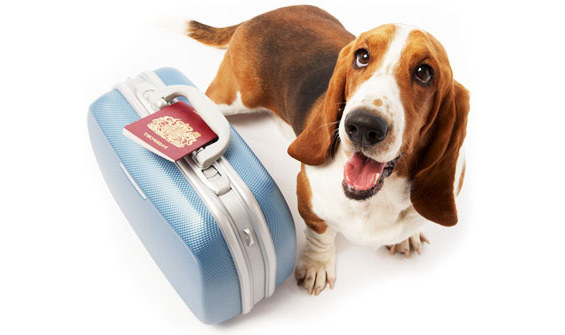
Planning and preparation are necessary when traveling with family pets. Consider whether your pet is comfortable when traveling. Some animals, like some people, function better in familiar surroundings. A car-sick animal can make a trip miserable for everyone. Some ill or physically impaired dogs and cats cannot withstand the rigors of travel. If this is the case, discuss options such as using a reliable pet-sitter or a clean, well-managed boarding facility provided at Pet Haven.
If your pet is not accustomed to car travel, take it for a few short rides before your trip. Cats should be confined to a cage or crate to allow them to feel secure and to avoid having a pet under your feet while driving. Stick to your regular feeding routine and give the main meal at the end of the day or when you reach your destination. Feeding dry food will be more convenient, assuming your pet readily consumes it. Dispose of unused canned food unless it can be refrigerated. Take along a plastic jug of cold water in case other reliable water sources are not available. Give small portions of food and water and plan to stop every two hours for exercise. Remember to include a leash with your pet’s traveling supplies.
Pets should not be allowed to ride with their heads outside car windows. Particles of dirt can enter the eyes, ears, and nose, causing injury or infection.
If you must leave your pet in a parked car, be sure to lock all doors, park in a shady area, and open windows wide enough to provide ventilation without enabling your pet to jump out or get its head caught. Be aware of weather conditions. You should not leave your pet in a parked car when the temperature and/or humidity are high or when temperatures are near or below freezing.
Air travel is of most concern to pet owners. You can minimize the chances of an unpleasant experience by following a few guidelines. Federal regulations require that pets be at least 8 weeks old and weaned at least 5 days before flying. Generally, a health certificate (which is not more than 10 days old) must be available before pets will be permitted to fly. A valid rabies vaccination certificate will also be required. Contact the airline well in advance for specific regulations and to secure your pet’s reservation. Try to book a nonstop, midweek flight and avoid plane changes if possible. During warm weather periods choose early morning or late evening flights. In colder months, choose midday flights. Arrive at the airport early, exercise your pet, personally place it in its crate, and pick up the animal promptly upon arrival. Do not take leashed animals on escalators.
A few general tips apply whether you travel by car or plane. Be sure your pet is properly identified with a current tag or a microchip. Grooming (bathing, combing, trimming nails) before a trip, plus having its favorite food, toy(s), and dishes available will make your pet more comfortable. Have both proof of rabies vaccination and a current health certificate with you when crossing state or international borders. Before undertaking any trip, consult your veterinarian to be sure that all required vaccinations are up-to-date and to receive a health certificate within ten days of travel.
At Pet Haven Animal Hospital we are able to help you with any of your travel needs and ready to answer any questions you may have!
Happy Holidays!!!

